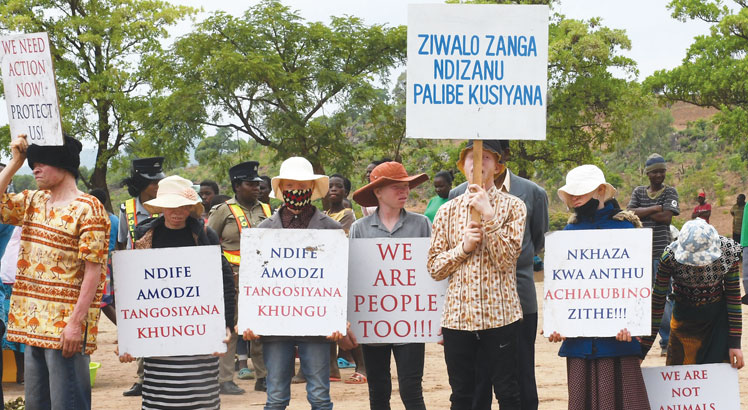When it gets dark, some people look forward to sleeping so they can rest from the day’s sojourns, but others use darkness to do evil.
One such group that falls victim to assailants at night are persons with albinism. Persons with albinism dread to go to bed when they consider that some people with evil intentions may be after their lives because of their skin condition.
The murder of a Kasungu-based three-year-old girl Talandira Chirwa, who was stabbed on the neck and had her arm chopped off, is one example of how far the assailants can go in their gruesome venture.
On the fateful day on November 30 2022 around 23:00 hours, Talandira was hacked by unidentified assailants while sleeping by her grandmother’s side.
This is one example of how persons with albinism in Malawi suffer human rights abuses such as abductions, killings and mutilations due to myths that their bones have supernatural powers.
Nkhata Bay-based primary school teacher, only identified as Nyakondowe, says she fears for her life and that of her two siblings who have albinism.
Persons with albinism calling for a safer environment
The 27-year-old teacher says her house is not secure and some assailants once hit them. Her only hope is members of community policing who provide security in her locality.
“Communities patrol our area to curb the inhumane and barbaric behaviour,” she says.
Malawi Government has taken steps to end attacks on people with albinism. In 2019, the government distributed mobile personal security alarms to persons with albinism.
The government also offered cash rewards to anyone with information about killers and abductors of people with albinism.
The government also outlined strategies to protect people with albinism through the National Action Plan on Persons with Albinism in Malawi (2018-2022).
Apart from local initiatives, international organisations have joined the fight against the vice.
The United Nations expressed concern that persons with albinism are at risk of extinction in Malawi.
Amnesty International called on the authorities in Malawi to improve the protection of persons with albinism.
According to a 2021 Malawi Police Service report, they recorded four cases of tampering graves of persons with albinism.
In 2022, police reported that one person, Talandira, was killed. Police also recorded cases of tampering graves of persons with albinism and some people were found in possession of human tissue.
While hostility against persons with albinism continues, not all is lost as the African Charter on Human and People’s Rights-Disability Rights Protocol, also known as the African Disability Protocol (ADP), is rekindling the fight.
The ADP calls upon African Union (AU) members to formulate disability-friendly laws and policies to promote disability rights in a localised context.
The protocol addresses issues such as customs, harmful traditional beliefs and practices and the role of the family, caregivers and community members.
Also known as the Banjul Charter, it was adopted in 2018 as the Disability Protocol to the African Charter on Human and People’s Rights.
The charter will come into effect after being signed and ratified by at least 15 members States of the AU.
Federation of Disability Organisations in Malawi project manager Ethel Kachala Chibwana stresses the need to have the protocol ratified.
She describes the protocol as one way of advancing human rights issues by Africans themselves.
“This is a great opportunity for us as Africans with disabilities to enjoy disability rights based on unique needs and experiences,” Chibwana explains.
Malawi is one of the countries on the continent that has signed, but yet to ratify the protocol.
Ministry of Foreign Affairs spokesperson John Kabaghe says Malawi is undertaking internal procedures that will lead to ratification.
“The ministry is working towards ADP ratification within the first quarter of 2023,” he says.
Kabaghe says: “The Penal Code was amended to specifically address these issues. The judicial system is able to successfully prosecute cases pursuant to such laws.”
Malawi is also party to the Convention on the Rights of Persons with Disabilities which upholds international standards on the protection of persons with disabilities, including persons with albinism.
Kabaghe says joining the ADP will enhance Malawi’s collaboration and cooperation in Africa on the protection, promotion and fulfilment of the rights of persons with disability in the region.
One of the organisations advocating for the ratification of the ADP is Sight Savers International (SSI).
Through the Equal World Campaign SSI is working with partners in Ghana, Malawi, Nigeria, Senegal and Sierra Leone in a campaign for the ratification of the protocol.
Sight Savers Malawi director Bright Chiwaula says his organisation has been part of the ratification process and found that it is in line with the government’s agenda
The post Hope for persons with albinism appeared first on The Nation Online.
 Moni Malawi
Moni Malawi 

